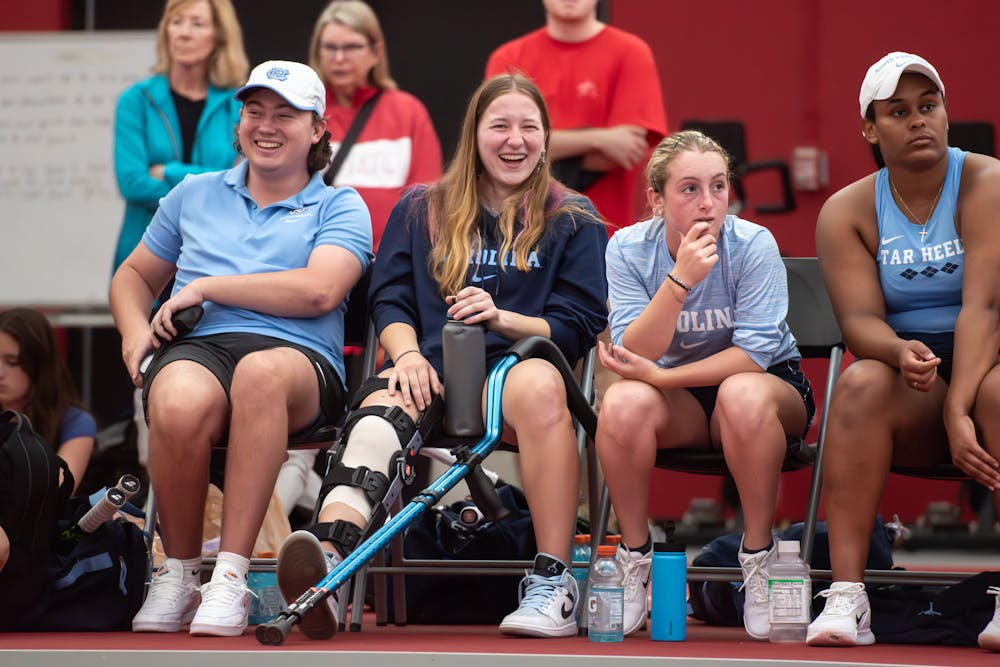“It’s the same kind of way a student does a summer job,” Brantmeier said. “You're earning money directly for your work and your talent. Athletics is no different.”
Sam Ehrlich, an assistant professor at Boise State University and sports law expert, said the sophomore's class-action lawsuit has the potential to throw another wrench in the NCAA’s notion of amateurism.
“The NCAA still bars making money specifically off of your athletic pursuits and specifically because you’re an athlete,” Ehrlich said, interpreting the lawsuit's argument. “But with NIL now — the way NIL has evolved, the way NIL has really taken off over the past several years with collectives and all these different things — the NCAA effectively doesn’t bar pay-for-play anymore.”
‘I felt like I was being put on trial’
This isn’t Brantmeier’s first battle with the NCAA.
Currently, the NCAA allows individual athletes to accept prize money, so long as it does not exceed "actual and necessary expenses." This is outlined in NCAA bylaw 12.1, which also provides exceptions specifically for incoming collegiate tennis players: They can claim up to $10,000 per calendar year in prize money before enrolling in college.
When Brantmeier competed in the 2021 U.S. Open, she knew there was little room for error in tracking her expenses.
“I wasn't super familiar with [the] NCAA’s rules, so I was kind of learning as I was at the tournament,” Brantmeier said. “In between matches, my mom and I would go call the NCAA customer service hotline and be like, ‘Can somebody please help us?’ Because, you know, the rules are really confusing and convoluted.”
Brantmeier said there was a lack of tennis-specific information and she received lots of conflicting answers.
“We were asking, every expense that we provided, if it was allowed for [the] NCAA,” Brantmeier said. “So anything we did end up expensing, we got direct confirmation."
Still, Brantmeier's lawsuit alleges the NCAA took issue with several of the expenses she submitted for the 2021 U.S. Open.
Brantmeier and her mother purchased a portable scanner to keep track of receipts using competition-related expenses — a purchase the NCAA deemed unnecessary. The NCAA also disputed Brantmeier's claim for racket restringing (it took place outside of a 14-day pre-competition window) and denied her mother's portion of lodging expenses in New York City, arguing that it wasn't an essential expense. Brantmeier was 16 at the time.
To get the day's news and headlines in your inbox each morning, sign up for our email newsletters.
As a result, the NCAA refused to certify Brantmeier as an amateur for the 2022 fall season, the lawsuit claims. If she had played and was later declared ineligible by the NCAA, the Tar Heels may have been forced to forfeit matches.
“Feeling like I wasn't even on the team was so challenging,” Brantmeier said. “And just the way the NCAA went about the whole process made it even harder.”
By January 2023, the NCAA confirmed her eligibility following a $5,100 mandated donation to charity, according to the lawsuit.
“I felt like I was being put on trial,” Brantmeier said. “I had done everything in my power to make sure I was following all of these rules, so to be accused of seemingly trying to scam this system was so frustrating.”
'If it's not me, it'll be someone else later'
Crawley, the 2023 Intercollegiate Tennis Association National Player of the Year, made headlines in September when she was forced to return most of the $81,500 she was awarded for in the U.S. Open to maintain her college eligibility.
Brantmeier said she and Crawley were approached by attorneys from law firms Milberg and Miller Monroe & Plyler in the fall, who encouraged the two players to bring their case to court.
While Crawley declined to get involved, she told The Daily Tar Heel she completely supports Brantmeier, who is being represented by attorneys from the two firms.
Brantmeier's lawsuit does not seek damages. She knows her prize money is long gone. Instead, she is pursuing legal action to advocate for a change in the rule, to benefit other collegiate players who may find themselves in her or Crawley’s shoes in the future.
“It was definitely intimidating to take on an institution that's so respected and long-standing,” Brantmeier said. “But I truly believe that if it's not me, it'll be someone else later. And hopefully, if I do this now, then less people will be negatively affected by these rules, sooner than later.”
The NCAA did not respond to The Daily Tar Heel's requests for comment before the time for publication. The UNC athletic department, UNC women's tennis head coach Brian Kalbas and Nate Wood, the University’s associate athletic director for NCAA compliance, declined to comment on the case.
The complaint for Brantmeier v. NCAA can be seen below.
@shelbymswanson
@dthsports | sports@dailytarheel.com
Shelby SwansonShelby Swanson is the 2023-24 sports editor at The Daily Tar Heel. She has previously served as an assistant sports editor and senior writer. Shelby is a junior pursuing a double major in media and journalism and Hispanic literatures and cultures.



